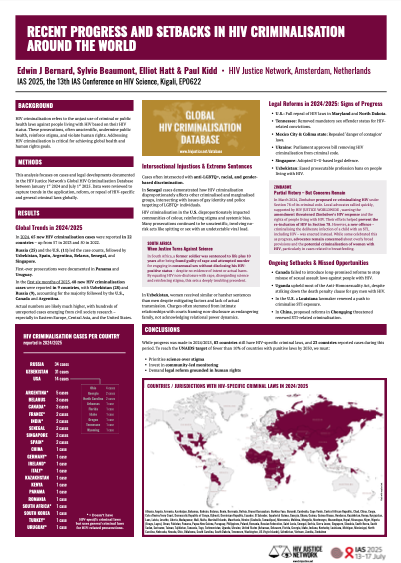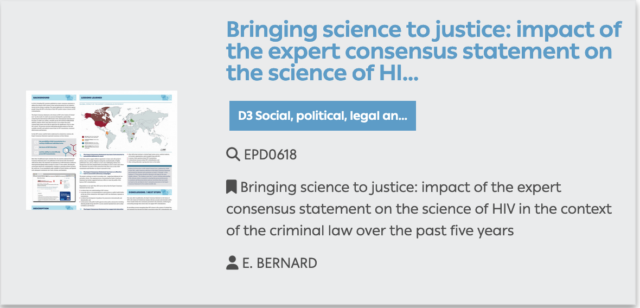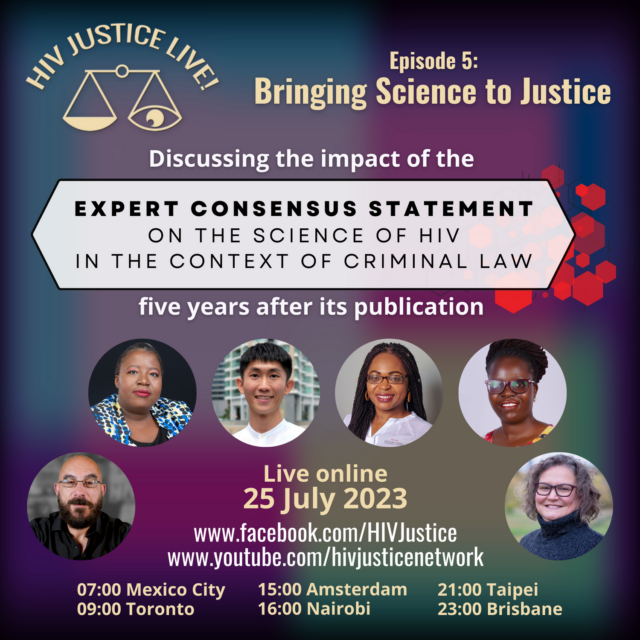Across the country, a growing coalition of advocates is pushing to repeal or update state laws that criminalize people living with HIV or AIDS.
In Ohio, six laws on the books either criminalize certain acts – including sex – for people living with HIV or substantially increase sentences for them compared to people who do not have the virus.
Most of the laws were passed decades ago, fueled by fear, absent scientific understanding about how HIV is transmitted and before advancements in HIV-related treatment were widely introduced. Laws still remain in place in 34 states.
There are no national reporting requirements that track arrests or prosecutions under the laws. Until now, it was unclear how frequently Ohio prosecutors have charged people under the laws, which also apply to people living with hepatitis or tuberculosis.
A report released today by Equality Ohio and the Ohio Health Modernization Movement (OHMM), two groups pushing for legal reform, reveals that more than half of the prosecutions over a six-year period were for acts – such as spitting or throwing bodily fluids – that were unlikely to transmit HIV. It also found a disproportionate number of people charged were Black compared to Ohio’s overall population of Black residents.
“Ohio is unique in that these antiquated laws are actually being utilized and enforced against everyday Ohioans who are living with HIV,” Kate Mozynski, an attorney with Equality Ohio and one of the co-authors of the report told the Buckeye Flame.
In 2022, about 25,000 people in Ohio had an HIV diagnosis. The rate of Black residents diagnosed with HIV was more than six times the rate of white residents.
The groups spent three years gathering information from prosecutors and courts in all 88 Ohio counties and identified 214 cases charged under the six laws. Often, the records lacked or had conflicting information on race or ethnicity, and the gender captured in law enforcement records didn’t always reflect a person’s gender identity.
That prevents researchers from fully understanding the impact that these laws are having on some of the most vulnerable populations in Ohio, including LQBTQ+ people, people experiencing incarceration and people of color, according to the report. The federal Centers for Disease Control and Prevention has warned that laws criminalizing HIV exposure are outdated and may discourage testing, increase stigma and exacerbate disparities in Black and Latino communities.
Cuyahoga County had the highest number of charges
The report found that:
- Prosecutions are concentrated in Ohio’s more populous counties, including Cuyahoga, Hamilton, Franklin and Lucas counties.
- Cuyahoga County charged four times the number of people under the six laws than Franklin County, which has a higher population and more people living with HIV and AIDS. Cuyahoga County accounted for 26% of the cases identified.
- The largest share of prosecutions involved Black men, based on recorded race and gender included in records.
A separate Marshall Project review of prosecutions under the six laws in Cuyahoga County from 2016 through 2022 examined 36 charges involving 35 defendants. That doesn’t didn’t include charges for solicitation, prostitution or loitering, which are generally misdemeanor crimes.
The cases involved 18 law enforcement agencies, including three hospital police departments and public transit police.
The Cuyahoga County Prosecutor’s office, which decides whether to prosecute felony cases under Ohio’s laws, said these charges are determined on a “case-by-case basis” after considering input from victims, according to Lexi Bauer, communications manager. Bauer noted that the majority of the “harassment by bodily fluid” charges in recent years were related to hepatitis and not HIV.
Ohio penalties among the harshest
Ohio’s laws remain among the harshest when it comes to HIV criminalization, not just based on the conduct that is criminalized but also the penalties, said Jada Hicks, staff attorney for The Center for HIV Law and Policy.
In Ohio, people living with HIV (or viral hepatitis or tuberculosis) can be charged whether or not they:
- Engaged in sex practices or other acts that could transmit the virus.
- Transmitted HIV.
- Used protection, such as condoms and/or dental dams.
- Had an undetectable level of virus in their blood and were unable to transmit HIV.
Most of the charges examined in the report fall under two Ohio laws.
One law makes it a crime for a person living with HIV (or hepatitis or tuberculosis) to “harass” someone with their bodily fluids. That would include spitting or throwing urine, feces or blood at another person.
Under the other law, a person can be charged with felonious assault if they have sex with another person without telling them that they are living with HIV.
The penalties for failing to disclose HIV status in Ohio are stiff regardless of whether the virus was actually transmitted or whether it was even possible for a person to transmit the virus. Possible sentences for individuals living with HIV can be anywhere from two to 29 times longer than those for Ohioans who are HIV-negative.
Ohio is also one of six states that require individuals convicted under one of these statutes to register as a sex offender.
“Ohio’s HIV laws don’t require actual transmission or even the intent to transmit,” said Nathan Cisneros, a researcher with the Williams Institute, which does legal and public policy research on sexual orientation and gender identity. “Conduct that couldn’t transmit HIV – like spitting and biting, loitering while having a conversation about sex work – can land you in prison.”
The Williams Institute also published a report today that looked at arrests under Ohio’s six laws over two decades and felony prosecutions in Cuyahoga County from 2009 to 2022. Researchers identified at least 530 separate allegations under the six laws since 2000. Having consensual sex without disclosing an HIV-positive status made up nearly half of the total cases. Incidents related to sex work and bodily fluid exposure each accounted for nearly one-fifth of the total.
Changing legal landscape
Thirteen states have either repealed or modernized their HIV laws, according to the Center for HIV Law and Policy, including Illinois in 2021 and New Jersey in 2022.
Ohio advocates have been at the forefront of efforts to challenge the laws as discriminatory. In 2022, the Center for HIV Law and Policy filed a complaint with the Department of Justice on behalf of people living with HIV in Ohio and Tennessee.
In December, the DOJ notified Tennessee it was violating the Americans with Disabilities Act (ADA) by enforcing the state law that increases penalties for people convicted of prostitution if they also have HIV. On Feb. 15, the Justice Department filed charges against the state in federal court..
Combing state records for HIV-related charges
OHMM researchers gathered information from county-level online court records and local county clerk and prosecutors’ offices in Ohio’s 88 counties for a six-year period ending in 2020. The project identified 214 cases prosecuted under the six laws.
Behind each one of the cases, there is a “real, everyday Ohioan who happens to have a medical condition,” Mozynski said.
Where in Ohio are people being charged?
The highest concentration of charges are in the state’s larger metropolitan areas.
- 26% in Cuyahoga County (Cleveland)
- 12% in Hamilton County (Cincinnati)
- 7% in Lucas County (Toledo)
- 7% in Franklin County (Columbus)
- Montgomery (Dayton) and Warren (Lebanon) counties, about 5% each.
What charges are most common?
More than half of the cases identified were for the charge of “harassment with a bodily substance,” which carries with it a penalty of up to 5 years in prison and a $10,000 fine. Cases with this charge are often related to acts against law enforcement or corrections officers or healthcare workers.
Charges don’t distinguish between bodily fluids that can transmit HIV, such as blood, and those that do not, such as saliva, urine or feces. People can also be charged if they are living with hepatitis, regardless of whether it is transmitted.
Prosecutors also don’t have to prove whether a person is capable of transmitting the virus or determine whether it is scientifically impossible to transmit the virusdue to prescription-drug treatments that have reduced the presence of the virus in a person’s blood – called a viral load – to undetectable levels.
A third of the cases were for “felonious assault,” which carries the most severe penalty of any HIV-related charge – up to eight years of incarceration and a $15,000 fine. Each sexual act can be charged separately. It also doesn’t require that the virus be transmitted.
OHMM found no cases where people were charged with “selling or donating contaminated blood.” The Williams Institute found six arrests over a 20 year period related to blood donation.
Read the OHMM (“Enforcement of HIV Criminalization in Ohio: Analysis of Court Cases from 2014 to 2020”) report here.
Read the Williams report (“Enforcement of HIV Criminalization in Ohio HIV-related criminal incidents from 2000 to 2022”) here.


